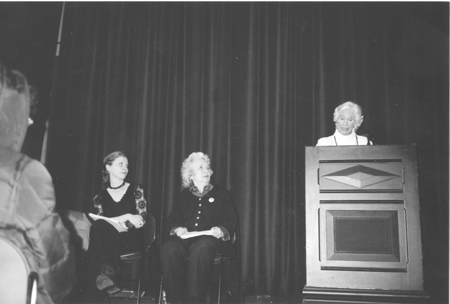By David Freedlander
“O love, as summer goes/ I must be gone, steal forth with silent drums/That you hail anew the bird and rose/When I come back to you, as summer comes.”
Words first heard around the Village over 80 years ago came back to life at the Jefferson Market Library for a Valentine’s Day marathon reading of the poetry of Edna St. Vincent Millay. Millay, perhaps the most famous poet of her day, symbolized for many Village bohemia of the 1920s.
Three actresses familiar to local theater — Frances Sternhagen, Sloane Shelton and Amanda Ronconi — alternated reading from the poems, bringing out the beauty, sensuality and humor of the verses.
The event was sponsored by the Millay Society, a group that promotes Millay’s work and raises funds to restore her estate in Austerlitz, N.Y., 135 miles to the north of the city. Steepletop, as the grounds are known, is a National Historic Landmark, but has fallen into disrepair.
“It is an absolutely breathtaking literary gem,” said W.N. Seymour, the president of the society and the organizer of the reading. “It is now shuttered and we want to open it up for the public.”
The actors, who volunteered their services to benefit the Millay Society, each had a unique connection to the poet and brought diverse sensibilities to the reading.
Sternhagen, most recognizable for her role as Cliff Claven’s mother in “Cheers” and as the title role in the off-Broadway production of “Driving Miss Daisy,” lived in Millay’s former home when she first came to New York. She was most recently in the Lincoln Center production of Edward Albee’s “Seascapes.”
“My mother loved Millay, and she was the one who first introduced me to her,” Sternhagen said. “The emotion of her poetry just carries you along. They are very actable.”
Shelton, a longtime Broadway veteran and Villager, knew Millay’s sister and executor, Norma Millay. Inspired by her visits with Norma, Shelton became one of the first to raise public consciousness of the estate, producing a DVD entitled “Millay at Steepletop.”
Edna St. Vincent Millay helped provide Shelton with her first big break in acting. At the start of her career she read the sonnet “All Is not Well” for her audition to the Royal Academy of Dramatic Arts. She was accepted, and recited the poem again at the reading.
The most unusual connection to the event belonged to Ronconi, who with her striking red hair bore an uncanny resemblance to Millay.
“The audition process for Amanda was that she was waiting tables at Tartine,” Seymour joked at the beginning of the show, in reference to the restaurant at 11th and Fourth Sts. “My wife and daughter walked in and they said, ‘My God! Look at that hair. Look at that face. There’s Millay coming back to life.’ ”
Seymour rewarded the actors with sparkling red-sequin purses for Valentine’s Day.
Millay achieved a kind of literary stardom early in her life that would be unfamiliar to poets today. When flappers walked the avenues, jazz filled the speakeasies and the first automobiles crowded the streets, she became the embodiment of the newly liberated, sexually transgressive woman.
There is hardly an account of Greenwich Village in the ’20s in which she does not prominently figure. Yet her roots in the neighborhood preceded even her fame. The poet’s unusual middle name came from St. Vincent’s Hospital on 12th St. Millay’s uncle was nursed back to health there after a sailing accident, and her mother wished to show her gratitude by naming her first-born child after the place.
At the time, T.S. Eliot was the favorite of the academics and Langston Hughes symbolized the Harlem Renaissance surging Uptown, but Millay was the quintessential Village bohemian. She wrote highly stylized, deeply emotional verses in traditional forms that many critics at the time viewed as anachronistic. The other writers and artists of the neighborhood regarded Millay with awe for her many lovers, radical politics and passionate penury.
“She was what everyone thinks the Village was always like,” said Sheryl Woodruff of the Greenwich Village Society for Historic Preservation, which co-sponsored the event.
Over 70 people attended the reading, far more than the Willa Cather Room of the library could hold.
“It was wonderful,” said Village resident and actress Marilyn Rosen, who was introduced to the poet by her high school boyfriend in the ’50s. “When you hear the poems read it really touches something deep down inside you.”
This is the first time that the Friends of Millay Society has sponsored a reading devoted exclusively to her love poetry. The group hopes to publish a collection of these poems in October.





































